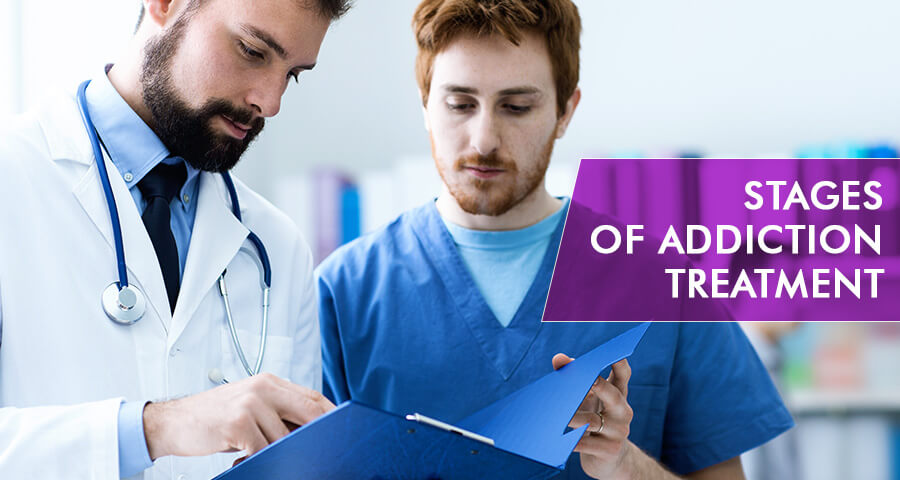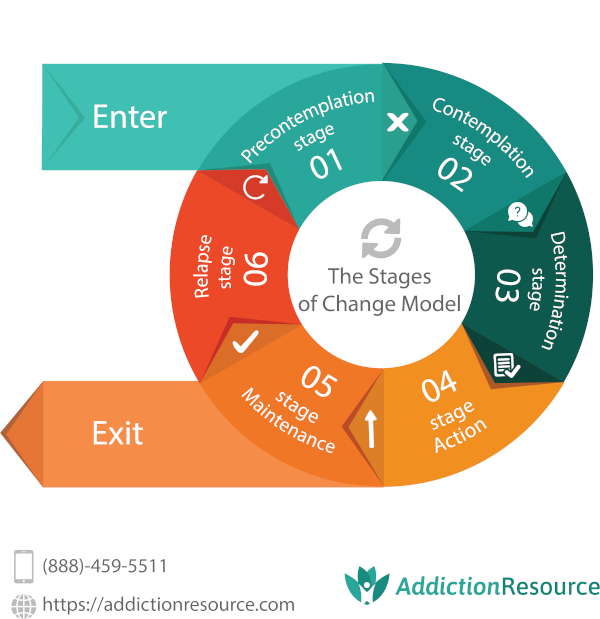
The road to recovery for many addicts may be long and hard even when they are very motivated. Knowing what to expect on this journey can make it much easier to cope with. This is why there is a focus on the stages of change in addiction recovery.
Table Of Contents:
- What is the Transtheoretical Model of Change?
- What Are the Stages in Addiction Recovery?
- What Happens in the Precontemplation Stage?
- What Happens in the Contemplation Stage?
- How Does the Preparation Stage Manifest?
- What Happens in the Action Stage?
- What Are the Features of the Maintenance Stage?
- How Does the Termination Stage Appear?
- Where To Ask For Help?

Addiction recovery stages are the behavioral phases of change that an addict experiences and has to go through when attempting to recover from addiction and leave it behind. Most addicts will eventually go through these stages.
This article will discuss these stages in detail. Addicts need to realize that recovery requires discipline and motivation at all phases to get through it.
What Is a Transtheoretical Model Of Change in Addiction Recovery?
Transtheoretical model stages are a behavioral change model conceived by renowned alcohol addiction researchers, Prochaska and DiClemente, in the 1980s. A high percentage of addicts experience these stages.
Information from studies can provide explanations about the reasons why some individuals can go through these stages on their own. Some others, unfortunately, are incapable of quitting substance abuse without extensive measures of staging an intervention.
Transtheoretical model stages emphasize decision-making abilities. The finding on the wheel of change crosses gender, age, social status, and other personal inclination.
The addiction model operates on the belief that behavioral change is not spontaneous, but is often indecisive and comes in phases. Each phase is mutually exclusive and requires reinforcement of intentions to scale through.
Prochaska and Diclemente’s stages of change model proposed that there are 5 phases experienced in the cycle of addiction.
Stages Of Change Addiction
The 5 stages of change addiction continuously evolve to replicate the behavior of addicts in every phase of decision making.
They Are:
- Precontemplation
- Contemplation
- Preparation
- Action
- Maintenance
A sixth phase, “termination” or “relapse” was later added in the stages of recovery to refine the model further.
The initial model proposed 5 stages of addiction. Oftentimes the model is referred to as 6 stages. This is with the information that among the steps to recovery, there is a final step of recovery that must be attained as an ideal. The 5 stages of change addiction recovery deal with the aspect of decision making and behavioral discrepancies, while the sixth and final phase emphasizes closure.

Here are the stages of behavioral changes, as postulated by Prochaska and Diclemente.
Precontemplation Stage of Change
In the precontemplation stage, the individual who is dependent on a substance is completely unwilling to seek any form of medical support. The person is either unaware of the deteriorating effect that the substance has on their personal life and the life of others, or is in denial of the severity of the problems.
During this stage, the addict is unable to see the rationale for stopping the substance, as they are unable to identify any negative effects or consequences from their drug use. Those with little information on the health effects of the addictive substance may find themselves in the precontemplation stage for longer. In some cases, addicts may be even involuntarily committed to rehabs or mental hospitals to prevent further self-harm or dangerous behavior.
Multiple unsuccessful treatment attempts and failure to create a working relapse prevention plan can greatly contribute to the extension of the precontemplation stage.
The challenge with this one is that it can be by will as a way of rebellion or as poor decision making and reluctance due to the overwhelming effects that withdrawal may cause. This rationale resigns the addict to an indifference, which makes this phase one of the most dominant of the six steps of change. The research found that 40% of addicts find themselves categorized under this step, though another study among smokers put that number at 74%.
Contemplation Stage
The contemplation stage of change is usually the next highest category, where behaviors are tilted towards an interest in change. In the contemplation stage, people realize that their habits or addictions may be creating an air of difficulty for them and also their family and loved ones. This stage comes with considerations on the possibility of finding a solution to the addiction problem. Advantages and disadvantages are laid on the table to predict further what life would be like if that decision was made. The feeling is ambivalence. However, the addict is open to understanding and learning how to manage and control their addiction.
The openness to new ideas does not necessarily translate to proactivity. This phase is merely a learning phase, with the possibility of commitment in the future. Many people have spent years in the contemplation stage of change in substance addiction. Contemplation is one of the 5 stages of recovery that requires a non-judgmental approach to motivating the user to seek necessary help. A positive outcome ends with the user accepting to seek medical help as soon as possible.
Preparation Stage
The preparation stage of change in addiction recovery marks the point at which the addict fully identifies that they have a problem with their addiction and sets out to make a positive change. In this stage, they mentally prepare for any support or substance abuse treatment that they intend to get.

This stage is important as the patient’s expectations before getting treatment can be integral to the success of their recovery. They need to understand the challenges they may face on the path to getting better.
During this stage, they should also identify the intentional decisions they will be making to aid their recovery, such as whether they plan to taper down in a well-calculated manner or quit cold turkey, whether they want to attend a program like AA, or any alternative to AA, and so on.
Action Stage
The action stage is the point at which the individual must finally change their behavior as outlined in the preparation stage. This stage can be difficult as it is where the actual change occurs, which can be tough for an addict as it throws them out of the habits or routines that they may have developed with the use of an addictive substance. Its success is dependent on several factors from previous stages.
The success of the action phase is crucial to the maintenance phase. The action stage of change substance abuse should not be rushed, rather is tailored to the specific needs of the individual in question. Ideally, friends and family members show invested support and encouragement during the action process model of addiction.
Contact with a program such as AA meetings is put in place to expedite the healing process, introducing the patient to a new drug or alcohol-free life. The action steps to recovery may last for about three to six months, depending on the levels of progress made.
Maintenance Stage
This stage of change is largely a phase of adaptation. The aim is to sustain the newfound life and to stick to lessons learned through the phases of treatment. Individuals who have gone through phases of successful treatment have to familiarize themselves with life without their cravings. A drug and alcohol-free life becomes a reality by taking the necessary precautions.
According to the transtheoretical model, relapse is always a nearby possibility, especially because people with long-term substance use disorder still feel the need to use once in a while, especially when the craving is triggered. Even in the maintenance phases of addiction recovery, the risks of relapse are still significant.
Termination Stage
Ideally, the cycle of addiction should end at termination. However, many people do not make it to this phase. Following the stages of change addiction, the termination stage is the final point where the person adjusts to abstinence and can control themselves even when there are addiction triggers present. This stage demonstrates a complete recovery where the substance no longer has control over the individual.

This phase is difficult to attain, and most people often have to live with the possibility of relapse. Though, it is possible to achieve the termination phase. Many people achieve it after one or more relapses.
However, with the right treatment and care, with contact from professionals, one can attain complete freedom from alcohol, drugs, and any other forms of addiction.
Ask for Professional Help to Prepare for the Stages of Recovery
The way that people progress through the different stages is very different and is dependent on each individual. While some may go through all the steps to recovery in a relatively short period, some people may find themselves stuck on a single stage, such as the contemplation stage, for years. Regardless of whether considering opioids or alcoholic recovery stages, they are identical.
The stages of recovery often require a stronger professional influence to transition smoothly from one phase to another. For example, to move from the action to maintenance stage, one can consider sober living homes, where it’s possible to get used to the real world after rehab. Professional treatment is imperative in all cases to impact behavioral processes and to achieve a successful recovery.
Here Are Some Ways That Professional Treatment Can Prepare One for the Addiction Recovery Changes:
- Intervention and motivational interviewing techniques: This is important as it can help the individual recognize their vulnerabilities and reasoning for drug use and how it affects those around them. These help greatly with the progression from one stage to another, such as from precontemplation to contemplation, which can be the most difficult progression for many.
- Providing treatment and care options: This will differ based on the specific drugs abused. For instance, those going through alcoholic recovery stages may need benzodiazepines, anticonvulsants, and other related treatments.
- CBT techniques: Cognitive-behavioral therapy will assist addicts in finding the root causes of their history with drug use, which allows these causes to be brought up and addressed.
- Motivation enhancement therapy: This therapeutic method can greatly help increase a person’s motivation towards recovering from their drug addiction, which is especially helpful for those who have passed the precontemplation stage but cannot find the personal motivation to progress.
- Pharmacological treatment of pre-existing mental health conditions: Many addicts may have been dealing with mental health conditions before they started abusing drugs, or it may have developed as a consequence of it. By treating these health conditions, it makes it easier for the addict to focus purely on their recovery.
- Programs such as group therapy: These programs can help the patient meet other individuals struggling with addiction, and they can each learn from each other’s successes and failures during these programs.
Professional assistance is helpful, especially in stages of addiction denial. The successes achievable through professional treatment and care cannot be overemphasized.
For those who are dealing with addiction to any substance, there is no better time to contact a professional help program than now. For those who feel they are not ready for direct treatment through rehab, they can consider counseling or a program for addicts like them, and their families can attempt to organize an intervention for them.
Hope Without Commitment
Find the best treatment options. Call our free and confidential helpline
Most private insurances accepted
Find Drug Rehabilitation Centers Near You Anywhere In the US
Addiction Resource team has compiled an extensive list of the top drug rehabilitation facilities around the country. Use our locator tool to find the best centers near you.
Page Sources
- Boston University, The Transtheoretical Model (Stages of Change), https://sphweb.bumc.bu.edu/otlt/MPH-Modules/SB/BehavioralChangeTheories/BehavioralChangeTheories6.html#headingtaglink_1
- Prochaska, J. O., & Velicer, W. F. (1997). The transtheoretical model of health behavior change. American journal of health promotion : AJHP, 12(1), 38–48. https://pubmed.ncbi.nlm.nih.gov/10170434/
- Etter, J. F., Perneger, T. V., & Ronchi, A. (1997). Distributions of smokers by stage: international comparison and association with smoking prevalence. Preventive medicine, 26(4), 580–585. https://pubmed.ncbi.nlm.nih.gov/9245682/
- Rohren, C. L., Croghan, I. T., Hurt, R. D., Offord, K. P., Marusić, Z., & McClain, F. L. (1994). Predicting smoking cessation outcome in a medical center from stage of readiness: contemplation versus action. Preventive medicine, 23(3), 335–344. https://pubmed.ncbi.nlm.nih.gov/8078855/
- Segan, C. J., Borland, R., & Greenwood, K. M. (2006). Can transtheoretical model measures predict relapse from the action stage of change among ex-smokers who quit after calling a quitline?. Addictive behaviors, 31(3), 414–428. https://pubmed.ncbi.nlm.nih.gov/16005158/
- Prochaska, J. O., & DiClemente, C. C. (1983). Stages and processes of self-change of smoking: Toward an integrative model of change. Journal of Consulting and Clinical Psychology, 51(3), 390–395. https://psycnet.apa.org/record/1983-26480-001


 Reviewed by:
Reviewed by:  Written by:
Written by: 
 FindTreatment.gov
FindTreatment.gov